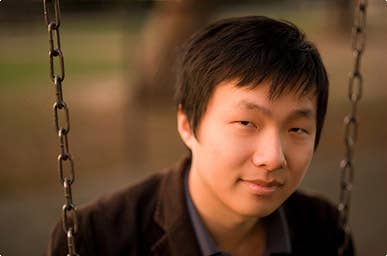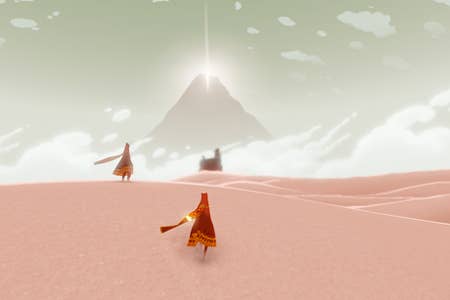Journey's End: Where Next for Jenova Chen?
Thatgamecompany's visionary head talks to Johnny Minkley about the "pain" of development, losing his co-founder, encouraging creativity and finding the right deal
After three long - and, to use his word, "painful" - years designing, delaying, perfecting and, finally, releasing Journey, you might think Jenova Chen could do with a break. No such luck for an out-of-contract indie.
Thatgamecompany's stunning PSN adventure, following fl0w and Flower, fulfilled the three-game deal struck with Sony shortly after Chen and co-founder Kellee Santiago formed the studio in 2006, fresh out of university.
"Even though we have various game ideas, if we don't get the money, nothing's going to happen"
Jenova Chen
Six years and a successful PlayStation-exclusive trio later, Chen found himself faced with not only figuring out who to work with next (having chosen to move on from Sony), but doing so without Santiago, who quit in the wake of Journey's release, alongside producer Robin Hunicke.
"The biggest challenge right now is that with Kellee absent, we have to pick up a lot of tasks outside game development," he sighs. "Where is the next budget coming from? We're talking to various people, but even though we have various game ideas, if we don't get the money, nothing's going to happen. So right now it's deal negotiation time."
The split, he insists, was amicable - and everyone knew it was coming. "We planned it for a long time," he says. "We waited until Journey was done. It wasn't, all of a sudden, 'I really don't want to be here'."

What actually happened, according to Chen, was the team's own grueling journey, in parallel with the game - at the end of which it became clear everyone was no longer in the same place.
"Working on Journey, the biggest thing I learned was that I'm not just a game designer, I'm also one of the founders of the company," he says ruefully.
"When we worked on the first two games, we didn't really focus on what Thatgamecompany is and what its culture is. What kind of people are the right fit, what kind of people aren't?
"For the past three years I've been working on figuring out the company culture," he continues. "At the beginning of Journey I couldn't care less about it; I just wanted to make good games. We pretty much hired the most talented people we could find. But then, during Journey, the problems really start to show.
"People start to think, 'I'd really like to make [different types of] games, I don't like Thatgamecompany-style games, it's too serious for me'. How do you deal with people like that?"
"If you're under deep pressure and you have to deliver to all these deadlines, you just can't think very creatively"
Jenova Chen
Within the four walls of a small studio, once such a prickly issue is out in the open, there's no hiding from it. Much soul-searching ensued as Chen attempted to define "what Thatgamecompany is".
The most important part of that was how to set up the studio to be as creative an environment as possible. "We don't believe in scaling up in a vertical way, creating hierarchies, because everybody at Thatgamecompany is very talented, and talented people don't like to be managed," he notes with a wry smile. "We find it's good to have a relatively flat structure where everybody's equally engaged.
"In the future, if we ever want to grow - which I don't think will happen in the next year or so - I would like to see multiple smaller teams to work on games, rather than a huge team."
Chen chatters enthusiastically about a video of a talk he watched recently by the great British comedian John Cleese on how to make people more creative.
"His point is that creativity is not a talent, it's a state of mind when you're working," Chen stresses. "In order to be creative you need to be in an open environment. If you're under deep pressure and you have to deliver to all these deadlines, you just can't think very creatively."
The day before we meet, he was hanging out at Blizzard. "Just a friendly visit," he quickly adds, aware of the potential for wagging tongues. He believes the two studios share the ex-Python's philosophy on the importance of time: "John Cleese himself likes to sleep on [an idea] for a day and give himself more time. The result is always more original," he says.
"We've both been like, 'Well, this is not good enough yet, we're not going to ship it', and the extra time really helped make our products stand out." Of course, elastic deadlines, as Chen acknowledges, are a "luxury" afforded only to the lucky few in the high-pressured business of making games.
Having set-off in search of the mountain on its development journey, then, Thatgamecompany soon realised, says Chen: "That we have people who believe in a different culture. So what we tried to do is figure out a mutual ground where there's some place where everybody can believe."
The team made it to the summit in January, when the project was finally laid to rest. "From the end of January to March, right before we launched the game, that's when it gets the worst," Chen states. "Without any feedback from the press and players, the studio is filled with uncertainty towards the future. Uncertainty is the most unbearable emotion, and so we really wanted to remove it.
"And that's when, eventually, we decided there's no way we can figure out one culture everybody can sign up for. It's better to separate so that the ones who remain at Thatgamecompany maintain a unified culture."
With his own house in order, Chen was at last able to focus on the future. Now things are moving fast. "In the next couple of weeks we will figure out something solid," he reveals. He's naming no names, obviously, but off the back of Journey's huge achievements, he's not exactly short of offers.
"Everybody's promising the best thing, but you really have to talk with them, meet them, to get an idea of what these people really are"
Chen on future partners
"When we came out of school it was a Cinderella story," he recounts. "At the time we were nobodies, students coming out of school. Today it's more like all these people saying, 'We want to work with you', and everybody's promising the best thing, but you really have to talk with them, meet them, to get an idea of what these people really are."
So what of his next game? "After my visit to Blizzard, a lot of people there were saying they have trouble dealing with voice over IP [VoIP], because people are just so mean over the microphone, over the Internet," he says.
"And I thought, actually there's a way to fix that. But that's probably not going to be my next game."
No, the next one, he teases, is: "Definitely inspired by Journey - the fact that so many people made friends. It's nice to hear that a game can bring people closer together and create more trust. I want all [my] future games to have that kind of quality."
It's a quality that is touching and inspiring people already in ways far beyond even the studio's own lofty ambitions.
"One player told us the game helped heal him," Chen reveals. "His father called him at midnight one night wanting to talk to him, but somehow he missed it. And his father passed away the second day.
"When he was playing Journey, he ran into this other player who was really taking care of him - if he failed at something the other player would wait for him and cheer him up, carry him through and show him places."
They became separated, Chen adds, and the player "eventually died at the mountain alone." But the pair were later reunited for the game's climactic sequence. "So to him he had this very personal message: that his dad might have died in the real world, but in his mind, in his spirit he was still with him. They all walk into the light."
Wherever Chen journeys next, others will surely follow.

